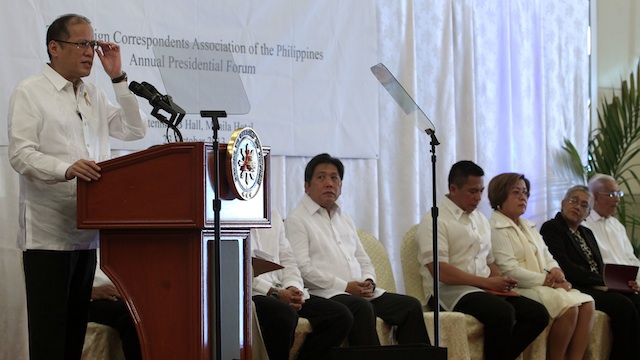SUMMARY
This is AI generated summarization, which may have errors. For context, always refer to the full article.

MANILA, Philippines – President Benigno Aquino III questioned the criticisms over the Disbursement Acceleration Program (DAP), and argued this was the stimulus program that “heralded [the] country’s economic boom.”
On Wednesday, October 23, Aquino did not hide his disappointment in the media’s framing of DAP, and defended the mechanism.
“For the past few weeks — nearly two years after I announced it — it has been unjustly and oddly vilified in the media. Perhaps I can repeat that for emphasis: Two years after I announced the program — nearly two years after the same media lauded government for its resourcefulness, and after two years worth of projects that have helped perhaps millions of our countrymen — it is receiving intense criticism from some quarters,” he said in his speech at the annual presidential forum of the Foreign Correspondents Association of the Philippines (FOCAP).
Aquino said the DAP was the stimulus package that helped “thousands of our countrymen,” including the relocation of informal settlers, building infrastructure, upgrading facilities of government hospitals, hiring 15,000 non-uniformed personnel for the Philippine National Police, funding the government’s Training for Work Scholarship Program, electrifying 1,513 towns in the country, and funding Project NOAH among others.
The President pointed out the timing of the criticisms, suggesting it was intended to distract the public by some individuals.
“All of these attacks came after plunder cases, among others, that were filed before the Office of the Ombudsman against a few well-known politicians,” he said.
“I do not need to remind you of the true issue that has seemingly been drowned out by all the background noise. And so I ask you: Let’s keep our eye on the ball. The public was outraged by the audacity with which public officials allegedly stole from the national coffers through [the pork barrel].”
According to the Department of Budget and Management (DBM), DAP – mainly sourced from savings or unreleased General Appropriation Act (GAA) items, as well as realignment and unprogrammed funds – was designed to ramp up spending and help accelerate economic expansion.
The Aquino administration has been forced to explain details of DAP after questions were raised over millions of pesos released after the impeachment of former chief justice Renato Corona. Critics tagged the release a bribe or incentive, while another former lawmaker, Sen Joker Arroyo, questioned where the funds given to senators came from.
When the Palace announced additional cash releases for projects of lawmakers came from DAP, senators started to raise concerns about its constitutionality and the illegal nature of releasing funds without the approval of Congress.
Not PDAF
In arguing the criticisms over DAP were unfounded and advanced with a motive, Aquino also defended hefty bonuses of Social Security Systems (SSS) executives and reforms in the Bureau of Customs (BOC) – two issues that had received much criticism in recent weeks.
“The criticism of DAP also coincides with the criticism we are receiving about the bonuses granted by the SSS—the framework for which was outlined in the GOCC bill we signed into law two years ago. Even our reforms over at the Bureau of Customs — which the public had long been asking for — has received unfair criticism,” he said.
Aquino also credited the DAP for helping the Philippines “overcome the inertia the economy was experiencing” in 2011, and for the 2012 6.8% economic growth, as well as the 7.6% growth in the first half of 2013.
He said it also helped the Philippines’ rise to the 58th spot in the World Economic Forum’s Competitiveness Rankings, and the granting of the country’s investment grade status by the three most renowned credit ratings agencies.
Aquino also decried comparisons made between the DAP and the Priority Development Assistance Fund (PDAF).
“I was perplexed to hear that some people equated the DAP with PDAF, when, simply, it was a program that strategically allocated funds to agencies that had already proven the capacity to implement projects and programs rapidly and efficiently. The legality of such a process has never been in question,” he said.
He said the “only thing” it had in similar with PDAF was the ability of the DAP to fund projects suggested by lawmakers, but said he found nothing wrong with “hear[ing] the proposals of the elected officials of the land” especially when they only took up 9% of the DAP program.
“Why, then, is the DAP being made an issue?,” he said. – Rappler.com
Add a comment
How does this make you feel?
There are no comments yet. Add your comment to start the conversation.